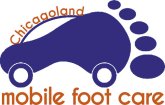We provide the best foot and ankle care at the comfort of your home
throughout Chicagoland of Cook, Kendall, Will, Lake, Kane, DuPage, McHenry counties , we will see You within 24-48 hrs!
We speak English, Spanish, Polish and Russian.

Frequently Asked Questions
What happens after I complete the online Contant Our Office form?
One of our intake specialists will contact you within 24 hours to schedule an appointment and provide you with a date and time frame of the doctor’s visit. Note: If the given time is not convenient, every attempt will be made to accommodate your schedule. At the time of your appointment, the doctor will discuss the time frame for a follow-up visit. Please Note: If you would like to set up an appointment IMMEDIATELY call us directly at 312-998-0974.
What should I expect on my first in home visit?
Our visiting Doctor will contact the patient prior to any in-home visit and discuss his arrival time. He will arrive at the home in a clearly marked “Chicago Home Foot Care” vehicle and intro/present himself in a professional matter wearing “Chicago Home Foot Care” scrubs.
What are your instrument/equipment sterilization standards?
Chicago Home Foot Care and our doctors take sterilization of our instruments/equipment seriously and go above and beyond the most accepted sterilization standards. With each home visit, the doctor will open a sterilized pouch of instruments in front of the patient before a procedure. We use Midmark Autoclave on a daily basis to sterilize instruments.
What information do I need to make an initial appointment?
When calling for the first time please be ready to provide the following information:
- Patient’s first and last name
- Date of birth
- Full address and main phone number for contact
- Insurance information
- Primary Care Doctor Name and Office Location ( town)
- List of Chronic Conditions patient has.
When should you see a Podiatrist?
You should visit a podiatrist if you have:
- Foot pain of any kind
- Diabetes
- Foot and lower leg irregularities (including flat feet, bow legs)
- Recent or recurring foot, ankle, or lower leg injuries
- Sores or infections
- Circulation problems
- And if you are elderly or disabled for general foot care, i.e. toenail trimming
What is an ingrown toenail?
An ingrown toenail is a common disorder that most often affects the outer edge of the big toe. However, the nail on any toe, or the nail on both sides of a toe, can become ingrown. The most common signs and symptoms are pain, redness, and swelling at the corner of a toenail.
Sometimes an infection develops. In this case, the swelling will become worse, and there may be white or yellow colored drainage from the area. A lighter-colored area of the skin may be surrounded by red skin. You may develop a fever, although this is unusual.
What are corns and calluses?
Corns and calluses are annoying and sometimes painful skin lesions that form in the areas of pressure. A callus refers to a diffuse, flattened area of thick skin on the bottom of the foot, while a corn is a thick, localized area on top of the toes that usually has a conical or circular shape. Corns can be painful to walk on, even when they are small. Corns and Calluses may pose a problem to diabetic patients who are often insensate and unable to feel the bottom of their feet. If not treated or trimmed, callus or corn can become a portal for bacteria and lead to the formation of ulcers.
If I have diabetes, should I see a podiatrist?
Proper foot care is critical for people with diabetes. Diabetes can lead to many different types of foot complications, including athlete’s foot (a fungal infection), calluses, bunions and other foot deformities, or ulcers that can range from a surface wound to a deep infection. More serious complications may lead to amputation. Diabetes is currently one of the ten leading causes of death in New Jersey.
How often will Medicare pay for nail trimming and corn and callus removal?
Medicare will cover this service once in every 61 days if your condition meets Medicare guidelines. Most common conditions that fit these criteria would be diabetes, swelling of legs or problems with circulation. Our Doctors are trained in recognizing those conditions and will inform you on the first visit if you are eligible or not.
My elderly parent does not speak English, do you have interpreters?
In addition to English, our doctors and staff speak Russian, Spanish and Polish. Note: A Chinese interpreter is also available with any home visit, upon request.
Can X-Rays be taken during a home visit?
Yes. If a diagnosis of fracture or bone infection is considered, diagnostic x-rays can be ordered at bedside by our physicians. When an x-ray is ordered, our office will contact the radiology service and schedule it for you. We use an outside x-ray technician who would typically visit the home, next day. The results will be read by a Board Certified Radiologist and the films along with all the reports will be available for our Doctors for review the following day. Please note that radiology services are covered for Medicare recipients only. Private pay patients will be charged an additional fee for the service.
My elderly parent suffers from Dementia; can I still schedule a home visit?
Yes, our doctors are extremely sensitive to the possible challenges that face patients with all types of impairments and disabilities. Yet, to better serve you, we do ask that you notify the office ahead of time so we are aware prior to the home visit. We also would like a caregiver/relative to be present during the visit.
Is it safe to cut my elderly parent’s toenails?
It’s best to seek professional medical care. With advancing years, the skin and nails of the feet frequently become dry and brittle, and numbness and discoloration often are present. These may be the first signs of such serious conditions as diabetes, arthritis, and circulatory disease. Ignoring these symptoms or not being able to recognize them when they appear can have serious consequences for patients, especially the elderly.
Do you accept credit cards?
Yes, we do, in addition to personal checks and cash as payments for the services.





